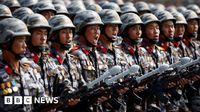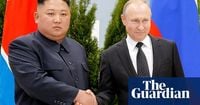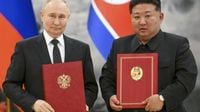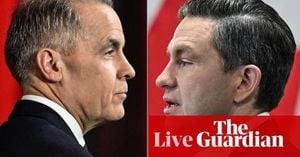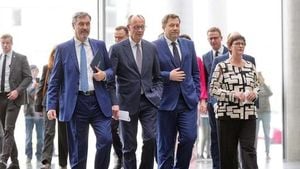North Korea has confirmed for the first time that it sent troops to Russia to support Moscow’s ongoing war against Ukraine. This unprecedented admission, made on April 28, 2025, marks a significant development in the military alliance between North Korea and Russia, which has been deepening under the leadership of Kim Jong Un and Vladimir Putin.
According to a statement from the Central Military Commission of the ruling Workers’ Party, Kim Jong Un ordered the deployment of troops as part of a mutual defense treaty signed with Russia in June 2024. The statement, released by the state-run Korean Central News Agency (KCNA), indicated that North Korean forces had played a crucial role in reclaiming territory in the Kursk region that had been held by Ukrainian forces.
Kim Jong Un emphasized the honor of fighting alongside Russian troops, stating that their mission was to “annihilate and wipe out the Ukrainian neo-Nazi occupiers and liberate the Kursk area in cooperation with the Russian armed forces.” He hailed the North Korean soldiers as “heroes and representatives of the honour of the motherland,” underscoring the ideological framing of the conflict as a struggle for justice.
The acknowledgment comes in the wake of Russian Chief of Staff Valery Gerasimov's praise for the North Korean troops, who he claimed had significantly assisted in defeating Ukrainian forces. Gerasimov reported to Putin that the Kursk region had been fully reclaimed, a claim that Ukraine has vehemently denied, insisting that its military operations in the area continue.
Ukrainian officials had previously estimated that around 14,000 North Koreans were deployed to fight against their forces, with 3,000 reinforcements sent to replace early battlefield losses. Reports suggest that North Korean troops faced heavy casualties, with South Korea’s National Intelligence Service estimating that about 300 soldiers were killed and another 2,700 injured. Ukrainian President Volodymyr Zelenskyy provided a higher estimate, claiming that 4,000 North Korean soldiers had been killed or wounded, while the United States suggested a lower figure of approximately 1,200 casualties.
Despite their initial lack of preparation for modern warfare, North Korean forces have reportedly adapted quickly to the battlefield conditions, contributing to Russia's military strategy in the region. However, experts have noted that these troops, drawn from an elite unit known as the Storm Corps, are still vulnerable due to their inexperience with drone warfare and the lack of armored vehicles.
The U.S. State Department responded to North Korea’s confirmation of troop deployment by condemning it as a perpetuation of Russia’s war against Ukraine. A spokesperson emphasized that both North Korea and Russia must be held accountable for their actions, stating, “Countries such as North Korea, whose support has perpetuated the Russia-Ukraine war, bear responsibility.”
South Korea's government also condemned North Korea's actions, calling the troop deployment an “admission of criminal act” and labeling it an inhumane decision that sacrifices young soldiers for the regime's interests.
In addition to military support, North Korea has reportedly supplied Russia with significant quantities of artillery and ammunition, further strengthening the ties between the two nations. Analysts suggest that this cooperation could lead to North Korea receiving advanced military technology from Russia, which could enhance its own nuclear weapons program.
As part of honoring the sacrifices made by its soldiers, Kim Jong Un announced plans to erect a monument in Pyongyang to commemorate those who fought in Ukraine. He stated that flowers would be placed before the tombstones of fallen soldiers, highlighting the regime's efforts to frame the conflict in a heroic light.
This military collaboration and the recent confirmation of troop deployments signify a shift in the geopolitical landscape, as North Korea seeks to solidify its alliance with Russia amid increasing international isolation. The relationship between the two nations, characterized by mutual support and shared interests, is viewed as a strategic response to the pressures exerted by the West.
In a broader context, the deployment of North Korean troops to Ukraine represents a significant escalation in the conflict and raises concerns about the potential for further military cooperation between Pyongyang and Moscow. As the situation develops, it remains to be seen how this alliance will impact the ongoing war and the international response to the actions of both countries.
The implications of North Korea's involvement in the Ukraine conflict extend beyond military cooperation, as it also reflects the shifting dynamics of power in the region. With both nations facing sanctions and diplomatic isolation, their partnership may serve as a counterbalance to Western influence, potentially reshaping alliances and geopolitical strategies.
As the conflict continues, the international community watches closely, grappling with the consequences of North Korea’s military engagement in Ukraine and the broader implications for global security.
